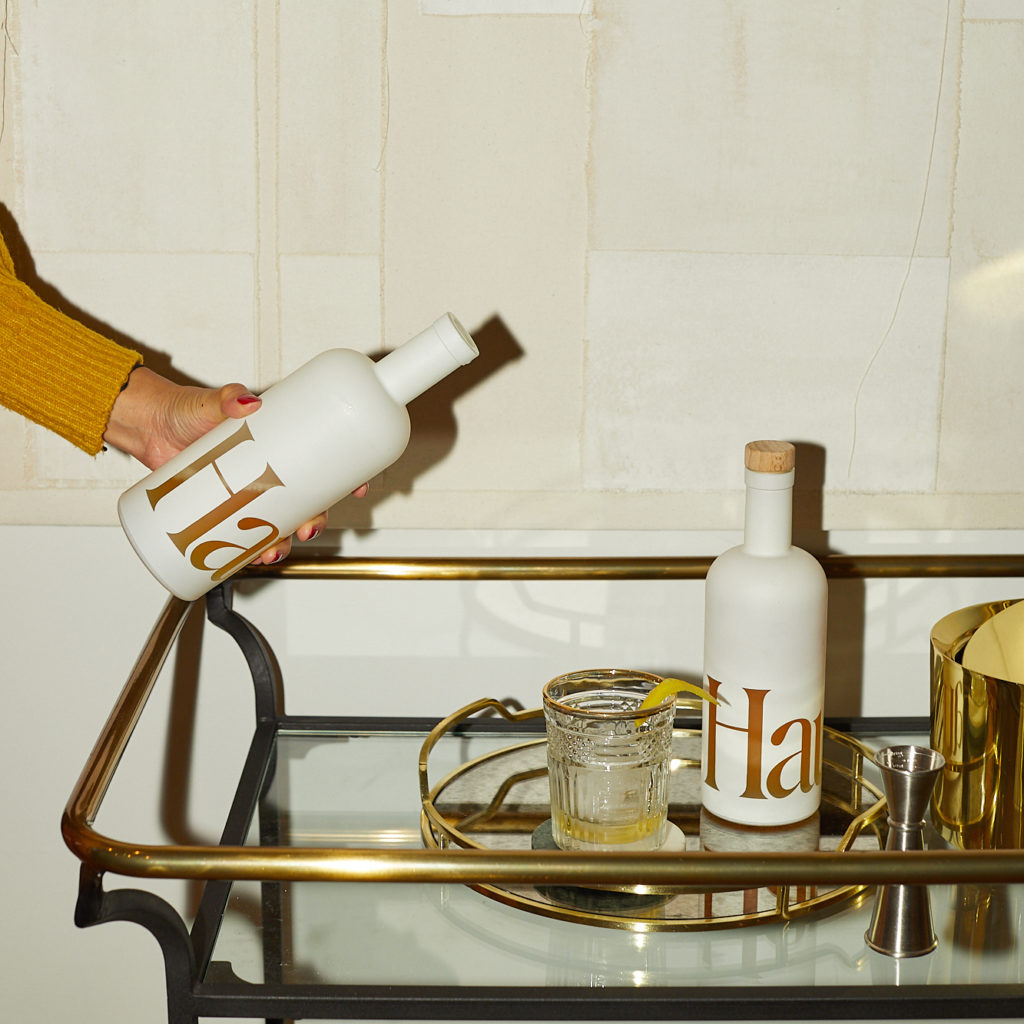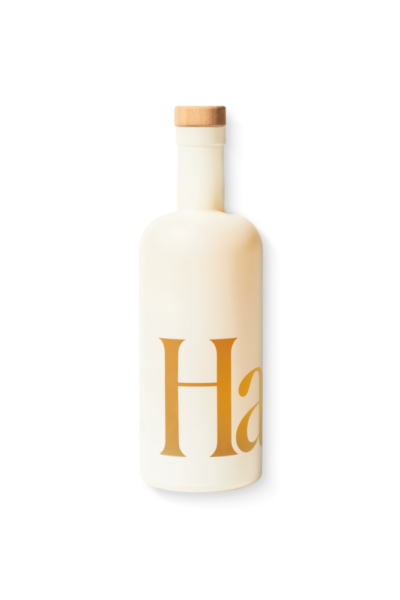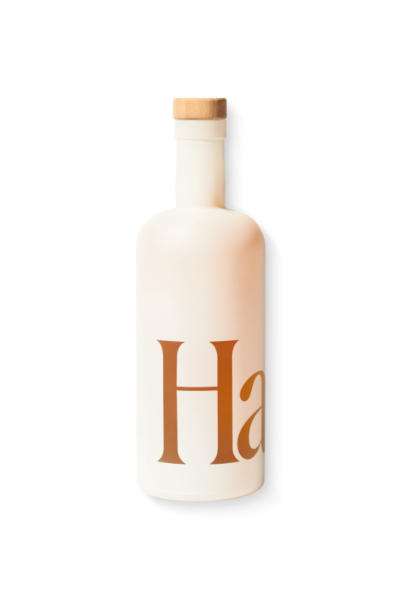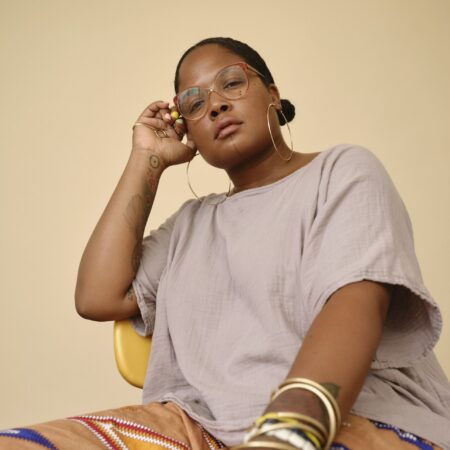From skincare to suitcases, mattresses to multi-vitamins, just about every traditional industry has been subjected to a “millennial brand” makeover, complete with trendy direct-to-consumer e-comm stores and Instagram-friendly branding. Not long ago, though, there was one notable exception: alcohol. When Helena Price Hambrecht, a prominent creative consultant in Silicon Valley, married Woody Hambrecht, a third-generation winemaker, the couple discovered a huge void—and suddenly Haus, an aperitif brand low in alcohol, was born.
But the intention was never to merely create a brand that would look cool on social media (though of course, it does). Tired of being hungover, or worse, accidentally drunk in friends’ posts, Helena joined forces with her husband to create a sustainably-produced liquor made with all organic and natural ingredients, housed in sleek frosted glass bottles. Since its launch in 2019, Haus has raised $4.5 million in funding and sold out so many times they’ve generated waitlists of 3,000+ customers. We sat down with Helena to learn how she was able to disrupt the alcohol industry, and how she’s keeping Haus running amidst the COVID-19 crisis.
The Helm: How did you go from working in Silicon Valley to founding your own alcohol brand?
Helena Price Hambrecht: My background is in tech, I got my start 10 years ago doing launch PR for startups. I was responsible for everything from positioning to getting a company ready for press and market—a great toolkit to use in your own startup. Then, around 2012, I ended up becoming this “brand person” for Silicon Valley. I noticed in my general consumer research that Silicon Valley was ready for visual content and creative, but no one in the photography scene seemed to care about tech. I thought maybe I could own that and bring all my skill sets together. I ended up building a production company and doing creative work for pretty much every company you could think of—Google, Facebook, Twitter, Airbnb. I had a hand in so many brands that I knew the startup world really well and what it takes to build a brand. Then Woody, my husband and co-founder, is the wine and spirits guy.
When I married him, I had no idea that Haus would be a thing or that we’d be co-CEOs of a startup together. He was making beautiful aperitifs [for other brands] that he’d been inspired by when he lived in Europe and wanted to make them in America. He was doing everything right with those brands from a traditional standpoint—he got a cool distributor and got in all the cool-kid bars and restaurants, got on the Best Cocktail lists in America, but as an independent brand you have very little control of how your product ends up in the market. He wanted people to drink them like they drink aperitifs in Europe, but they were just getting mixed into these high-proof, super boozy cocktails with 10 ingredients, so the drinker had no relationship with the product. We joke that it took a techie marrying a winemaker for Haus to exist.
"Being drunk all the time is not cool in the age of Instagram."
The Helm: What was the big “aha moment” that led you to start Haus—and why did you decide to target millennials specifically?
Helena Price Hambrecht: I was going through a drinking dilemma that’s part of being a career-focused millennial. You’re drinking all the time—networking events, business dinners, conferences, dates, friendships—and the downsides were starting to get to me. Being drunk was never my goal at any of those things, there’s something very beautiful about gathering over a beverage, but it happens and I didn’t have time for hangovers. I felt myself and most of my friends having this problem and I was like, “Why is there not a better way to drink? Why is everything so boozy and sugary and shitty?” That was enough to get my wheels turning about the future of drinking in America—what do millennials want? I started doing research and immediately saw that [other] millennials wanted the same things that I wanted. They care about their health and image; being drunk all the time is not cool in the age of Instagram. People care about what goes into their bodies, they care about authenticity, and transparency, all these things that alcohol wasn’t giving them. Every other industry had been disrupted—Glossier, Away, Everlane—brands that make stuff for millennial values. I couldn’t see a brand like that anywhere in alcohol. Why? Because the alcohol industry is like a mafia and you can’t actually build a direct-to-consumer alcohol brand because it’s illegal. You have to go through a three-tier system: get a distributor, go through a retailer, then go into bars and restaurants. No one has ever been able to sell directly to a drinker before.
The Helm: How were you able to get around those obstacles to become a direct-to-consumer brand?
Helena Price Hambrecht: Innovation is not in Big Alcohol’s interest, because they want you to keep drinking Grey Goose. I was complaining to Woody and he was like, wait a minute, there’s a loophole for aperitifs—if it’s under 24 percent alcohol and made mostly of grapes, you can go direct-to-consumer. No one had ever used that loophole to build the Glossier or Everlane of alcohol and I was like holy shit, we can build the first direct-to-consumer spirits company!
Aperitifs check all the boxes—they’re low in alcohol and botanical, and we can make them even better with all-natural ingredients. We can be transparent about our ingredient list and nutrition facts. We’re authentic millennials, we’re not a corporation, we can build a brand that aligns with our values. It truly would not exist if we hadn’t married each other, so thank you OkCupid!
Shop Our Favorites From Haus
The Helm: How has the COVID-19 pandemic changed how you operate your business? Have you learned anything new as a founder?
Helena Price Hambrecht: It’s definitely a strange time. We’ve been on our farm up in Sonoma County since the beginning of March, which thankfully is an easy place to self-isolate and stay focused on keeping our family and our business healthy. The distance from the rest of the world is tough, so we’ve started hosting virtual aperitivo hours as a remedy to the times. We feel incredibly fortunate that our business model allows us to keep things running as usual; we have nine full-time employees and we haven’t [had to lay off anyone]. But that said, we are being extremely conservative with both spend and hiring right now, and we’re still shifting our strategy to do what’s best for the consumer. We’ve launched same-day delivery in San Francisco and Los Angeles, are incorporating virtual events, and leaning into partnership opportunities that support fellow small business owners.
E-commerce, grocery, and alcohol are all categories seeing growth during the pandemic. Personally, we saw 90 percent growth from February to March alone, and April is already our biggest month yet for the company. That said, we are trying to use our resources to give back to the community and take care of others in our industry. We recently announced The Restaurant Project, a collaboration with restaurants across the country where 100 percent of profits go to the restaurant you purchase from, covering their costs, supporting employees’ salaries, and keeping them in business during Covid-19.
The Helm: What’s the most important thing you did to prepare yourself for the leap to becoming an entrepreneur?
Helena Price Hambrecht: We just had to dive in. Woody and I are very similar in that once we commit to something, we’re all in. To the average person, it probably looked like a huge decision—Woody had a successful winery, I had a successful production company, we were both doing great. My friends were like, You’re throwing away your career that you’ve worked so hard for to start an alcohol company? We knew there was a lot of work ahead of us. Luckily, Woody already made aperitifs, so we knew what was involved on the backend and we had a production facility already. The biggest thing was building the brand and raising money because it’s expensive to start a brand, especially when there’s a physical product. I had to learn how to fundraise, that was the big thing.
"Innovation is not in Big Alcohol’s interest; they want to keep you drinking Grey Goose."
The Helm: Fundraising is something you’d never done before, where did you start?
Helena Price Hambrecht: Thank God for the internet. Previously, I had researched fundraising in my tech career to better understand it from every angle. But then, it really just came down to Googling every question I had, like, What makes a good deck? In the past 10 years, I’ve met a lot of people who are entrepreneurs, so I would also go to them and ask them to tell me about their own experiences. I needed to learn the game and I think if you approach people with a sense of curiosity, you can find out pretty much everything you need to know. But it’s also important to realize not every single thing will apply to you, and that you have to go with your gut as well. We raised a large seed round, $4.5 million total, slowly, over the course of a year and a half with multiple closes. We raised on SAFE notes and the terms increased as our company grew and interest in the round increased.
The Helm: Haus is very much a millennial brand. Do you find that that makes it tougher to get financial backing from investors?
Helena Price Hambrecht: For us, what made fundraising really hard, and it was hard, was that we didn’t fit in any category. We’re the first direct-to-consumer brand in the liquor space, so anyone in liquor thought we were out of our minds. Of course, we had other things working against us—we’re not Stanford or Harvard MBA grads, we’re married with a three-month-old baby. A lot of it was people connecting with the story of the brand; people who shared our same experiences [with alcohol] and understood we were solving a problem, which ends up making for a better investor anyway.
The Helm: How did you financially prepare yourself to start your own brand? Were there any major sacrifices you had to make in the first year?
Helena Price Hambrecht: Big time sacrifices. We had to work less in our other companies, which cut our income down to almost nothing. Woody and I also don’t have a crazy amount of money, even though we live on a vineyard and it looks like we’re bajillionaires, we had to be really frugal. (Woody’s grandparents bought the farm in the 1970s, and we bought the parcel with our home on it a few years ago.) I cashed out my retirement to pay for Haus’ first expenses. It wasn’t much, but it got us through a tough month or two when we couldn’t seem to fundraise from anybody and our bank account was at zero. We also didn’t get childcare until we launched, we would just take turns watching our baby while we worked on stuff. There were scary moments where pretty much every dollar we had, we put into Haus. It was just like, how can we survive on as little as possible? Once Haus launched, we were able to pay ourselves a meager salary, which all goes to our nanny. If you’re looking to start a company, you’ll need to get comfortable with a very low balance in your bank account.

The Helm: As a new founder, how did you navigate learning how much of a salary to pay yourself?
Helena Price Hambrecht: We asked around, we wanted to see what was on the high and low end. For me in particular, I think everything is driven by markets and industry averages. We knew it couldn’t be a 22-year-old founder’s salary because we can’t work for nothing, we have a child and don’t want to be so burdened by financial anxiety that we can’t do our jobs. I know people who pay themselves nothing because they have other means of income, and I know people who pay themselves $250,000 because they have multiple kids and a large mortgage on a house they bought before they started the company. Woody and I were somewhere in the middle. We ended up choosing a number that was much less than what we made at our previous jobs, but still allowed us to cover all of our expenses—we couldn’t necessarily save for retirement, but we could live comfortably, pay a full-time nanny, go out to eat sometimes, and pay off some ongoing debt. At this point, we still don’t make more than our employees. Financial anxiety is a huge distraction that can affect your productivity, and you’re only diluting your own equity so it should ultimately be your choice. If there are investors that shame you for paying yourself, or think you should pay yourself the salary of a 22-year-old who has roommates and no children, those aren’t investors you want to work with.
The Helm: Are there any challenges to running a business with your husband?
Helena Price Hambrecht: I love having a company with my husband. We were both so career-focused already that work and life just blended for both of us. We each have our own expertise and don’t overstep; I trust Woody to be the authority on the supply chain, how to make an aperitif, and what the production facility needs. Woody trusts me on brand decisions and consumer-facing stuff. However, we’re both very stubborn and have a debate about something at least every day—but it’s never a fight, we just each have to come to the table with a well-thought-out proposal and it helps us learn more about each other’s side of the business. We also have a business coach, who’s kind of a couple’s therapist too. I couldn’t recommend it more for founders and couples. Our coach has a background in psychotherapy; it’s great because they have the expertise to handle professional context resolution, but they also know that whatever your setbacks are communication-wise, all of that is coming from a deeper place.
"Therapy made me a better businesswoman; I was able to figure out why I felt stuck in certain areas of work."
The Helm: How did a business coach become part of your work process?
Helena Price Hambrecht: I’d gone to therapy for years, so I knew how much it helped me professionally. I started therapy because there were certain things that didn’t feel comfortable to me at work—like confrontation and negotiation—so I wanted to dig into why. Therapy made me a much better businesswoman; I was able to figure out why I felt stuck in certain areas of work. One of Woody’s good friends Cameron Yarbrough founded a company called Torch, a business coaching service. He introduced us to his coach, who works with a bunch of great people like Alexis Ohanian [co-founder of Reddit], and they decided we were worthy of taking on. It’s the best money you can spend, because all of us bring our own trauma or baggage to business. If you are reaching problem points with management, even if it doesn’t feel like a crisis, the best thing you can do as a founder is to be self-aware and know that you, as much as anyone else, could probably improve in certain aspects. It makes you better, but it also makes your employees respect you more.
The Helm: The Cut recently published a piece questioning when the millennial aesthetic will die and what will happen to brands when it does? What are your thoughts on that?
Helena Price Hambrecht: [The rise of millennial brands] is creating some understandable skepticism from the customer. We’ve seen a little bit of it at Haus, where people assume our product is going to suck because of how it’s branded. There’s so much good branding out there right now, and a lot of those companies spent all their money on branding, but they didn’t focus on product or customer experience, so now there are issues because it looks so good but the experience was disappointing. Obviously having a slick brand is a basic requirement at this point, but if you don’t put the same amount of effort into your product and if you don’t have an authentic story, that’s just not going to work anymore. People are realizing that there’s so much more to a successful company than having good branding. It’s going to be a moment of reckoning for a lot of brands that started for the wrong reasons.

The Helm: What are the advantages and/or disadvantages to being a direct-to-consumer brand?
Helena Price Hambrecht: A lot of people think we chose direct-to-consumer because it’s the cool word of the day, but for us, the advantage is being able to sell directly to the drinker versus having to convince a distributor, who has to then convince beverage directors and bartenders, that this is cool. It’s amazing that we can tell our story directly and that customers can just buy it. It’s crazy that that’s never happened in liquor. It’s also been amazing to have direct dialogue with a customer, not just from a conversational standpoint but from a data standpoint where we can know how many people drink us in New York or California. We can also, because of that dialogue, figure out what customers want. Ultimately, our goal is to build a portfolio of products for our generation. We’re starting with aperitifs, but you can think bigger down the road from having this data. We will get into wholesale this year, but again, the beauty of it is our leverage: we have already built the customers and the demand for those wholesalers.
The Helm: How do you measure success for both yourself and the brand?
Helena Price Hambrecht: My biggest motivator is justice and fairness, which in our case means how we, as a generation, are not being given quality products. Why is there not a more sustainable, well-made beverage portfolio serving our generation? For me, that feels wrong, so I love the idea of building something that corrects that and gives a generation what they want and tells corporate alcohol they need to change. Woody is driven by making beautiful, quality products and he obsesses over the ingredients and the farm that they come from [Haus is made on Woody and Helena’s farm in Sonoma County, California]. We want to build the next Diageo or Pernod—the next big corporate portfolio that every drinker, bartender, and buyer knows that they can come to for an organic, well-made, transparent brand that they can trust.
The Helm: What did you waste money on in the initial starting phase of your business?
Helena Price Hambrecht: The biggest lesson we learned early was, you know how you interview employees thoroughly and check their references and everything? We didn’t really do that for vendors. We had a really amazing experience with our branding agency Gin Lane, but we had other vendors that looked good and had impressive client lists, but we didn’t do our homework and had really bad experiences. If we’d done our research we would’ve learned that those clients actually hated working with those vendors, and we would not have wasted money on a bad vendor experience. It’s pretty easy to spend a $100,000 on a project, whether it’s development or PR, and it’s easy to spend money in the wrong place.
"I’ve been underestimated my whole life, but that's not unique."
The Helm: Do you ever find it difficult to be taken seriously as a female millennial entrepreneur?
Helena Price Hambrecht: Oh, definitely! I’ve been underestimated my whole life, but that’s not unique. I had someone interview me once and at the end he said, “You’re smarter than I thought you’d be.” I’ve seen criticism online [in comment sections] that I’m just a mom, and how could I be that impressive [in business]. Over the years I’ve found you can just channel it as motivation: don’t get too down about it, don’t lose sleep over getting pissed at all the people who made you feel that way. I’ve also learned it’s not actually about me—it’s whatever I represent to that person. Something else I’ve learned is that I become more and more myself every year, I’m less afraid to be me—whether that’s saying certain things or talking a certain way, it actually saves a lot of time in terms of who’s going to want to work with you or who will respect you. If you’re trying to change yourself to fit an idea of what you think will be more respected or liked, then you’re constantly anxious about when the shoe will drop. I’ve found that I just have to be myself, and there are going to be certain people who don’t want to associate with that or they’ll judge it, but at least it feels more accurate to me. If people are going to judge me either way, I might as well just be myself.
The Helm: What’s one piece of advice you would give to women looking to start their own company?
Helena Price Hambrecht: Oh my god, do it! Just absolutely do it. There is so much information out there at your disposal, don’t worry about not knowing enough because you can learn everything on the internet. Don’t worry about not being respected, because there are going to be people out there who respect you. Don’t worry about people saying no because you will eventually find people to say yes. It really is a numbers game and if you truly believe in what you’re building, you will find your customers, your investors, your believers, and your press. You’ll find your people. You just have to be ready for a lot of people to not get it or to say no, and that’s the foundation of a good brand. A good brand is not for everybody.









